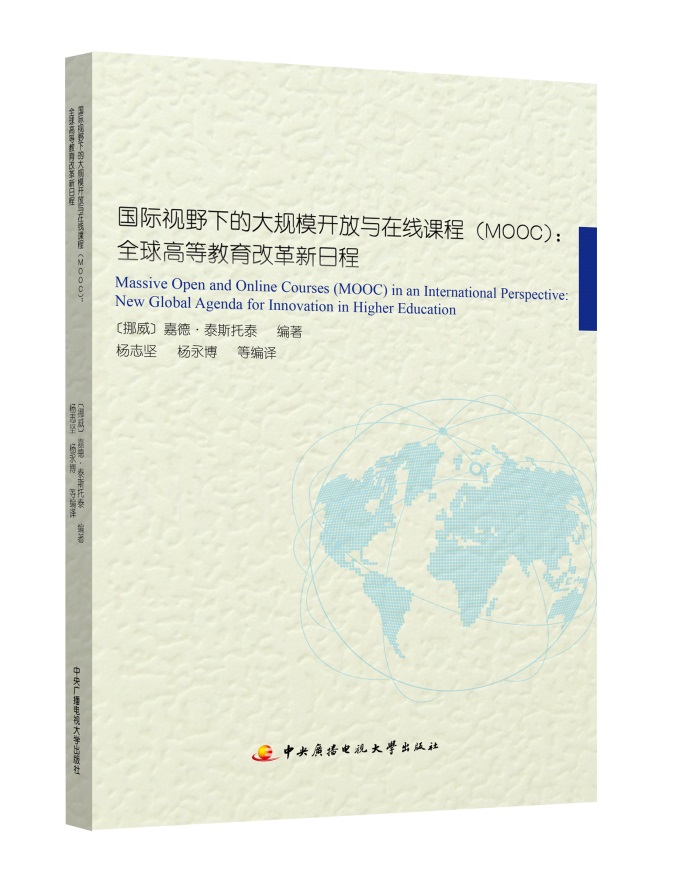 Massive Open and Online Courses (MOOC) in an International Perspective: New Global Agenda for Innovation in Higher Education introduced and translated by The Open University of China (OUC) from the International Council for Open and Distance Education (ICDE), published by the OUC (aka the China Central Radio & TV University, CCRTVU) Press came out in June, 2014. This book was translated and edited by the President of the OUC Yang Zhijian and the Director of the International Cooperation and Exchange Department Yang Yongbo etc., and is another important work following Open Educational Resources: Conversations in Cyberspace, a UNESCO book also translated by the OUC.
Massive Open and Online Courses (MOOC) in an International Perspective: New Global Agenda for Innovation in Higher Education introduced and translated by The Open University of China (OUC) from the International Council for Open and Distance Education (ICDE), published by the OUC (aka the China Central Radio & TV University, CCRTVU) Press came out in June, 2014. This book was translated and edited by the President of the OUC Yang Zhijian and the Director of the International Cooperation and Exchange Department Yang Yongbo etc., and is another important work following Open Educational Resources: Conversations in Cyberspace, a UNESCO book also translated by the OUC.

Massive Open and Online Courses (MOOC) in an International Perspective: New Global Agenda for Innovation in Higher Education, compiled by the Secretary General of ICDE, Gard Titlestad, summarizes opinions on MOOC from universities in five continents participating in the international seminar and scholars from the Institutions of Distance Education and completes its report based on further thorough research.
This book differentiates and analyzes relevant ideas like open, online, MOOC and subversive renovation from the perspectives of higher education, the demand for lifelong learning, financing, and technique as well as technology maturation, open education, resources and students studying the developing trend of open education and the motivation and depth of its revolution, which shows specific plans and actions put out by America, China, France, the African Union and the European Union dealing with the emergence of MOOC in policy and at other macro levels. This book also clarifies the cause and effect of the MOOC “tsunami”, the worldwide higher education institutions which have taken part in MOOC campaign and the general situation of development of MOOC in some related countries and areas. The book compares online education with MOOC, describing the two commonest types cMOOC and xMOOC and the operating situation of three suppliers of the platforms edX, Udacity and Coursera. In addition, the book analyzes the developing trend of MOOC and different attitudes and actions the students, teachers and senior management staff show faced with MOOC, focusing on the development track of open education, open education resources (OER), OCW, open courses and MOOC as well as the referential sustainable development model of OER in Northern Europe and the digitalized learning platform, and shows the relevant thoughts of the MOOCs international seminar in the OUC in 2013 and some important subjects in the current academic world about MOOC. This book also provides six types of Creative Commons (CC), which helps the users apply rationally and share maximal resources including books, pictures, music, video, artistic works, news and educational works.
Gard Titlestad has mentioned the value of this book in aiming mainly at the governmental level of the macro educational system. However, it also has value as a reference at the micro level of school top manager, researchers and people who are connected with constructing public utilities.
Vice President of the OUC and Director of the Academic Committee Zhang Shaogang expressed some thoughts after reading this book. He said that MOOC has been a hot topic in recent years bringing society such a “digital tsunami” that it had left a powerful influence. It involves a change in traditional study modes and individual study styles, which has a huge impact on educational concepts, systems and mechanisms, educational modes and the patterns of curriculum. It puts pressure on different levels of schools and teachers and also makes people feel the breakthrough of the lowest groups in the educational gap in this ‘We Media’ era and the voluntary taking on responsibility by elite educational institutions. It catalyzes the revolution of the traditional university system and puts pressure on those educational groups realizing and positively solving a series of issues under this current education system including the communication between people having different educational backgrounds, the mutual recognition of academic credits, the sharing of excellent quality educational resources, online education quality and educational equity, etc.
By Lai Jiwen, the OUC